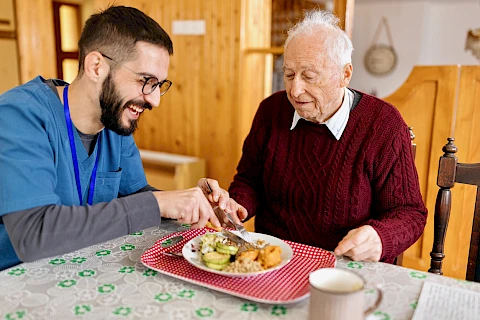
Managing senior health is sometimes complex, especially when it comes to cholesterol levels. High cholesterol can lead to serious conditions like heart disease and stroke. Caregivers play a crucial role in helping seniors maintain healthy cholesterol levels. Senior Helpers is happy to offer these essential tips on diet, exercise, and medication management for seniors so caregivers can effectively support their loved ones.
What is Cholesterol?
Cholesterol is a fatty substance found in your blood. Your body needs some cholesterol to function properly but too much can be harmful. There are two main types of cholesterol: LDL (low-density lipoprotein) and HDL (high-density lipoprotein). LDL is often referred to as "bad" cholesterol because high levels can lead to plaque build-up in arteries. HDL, on the other hand, is "good" cholesterol as it helps remove LDL from the bloodstream. High cholesterol in seniors can increase the risk of heart attacks, strokes, and other cardiovascular problems.
Diet Tips for Managing Cholesterol
A balanced diet rich in nutrients can help lower cholesterol and improve heart health. Include fruits, vegetables, and whole grains like oatmeal, brown rice, and whole wheat bread. Lean proteins like chicken, turkey, and fish should also be part of a vitamin-filled diet. Don't forget healthy fats from sources like avocados, nuts, and olive oil. Try to avoid foods high in saturated fat, including red meat, butter, and full-fat dairy products. Trans fats, common in fried foods and many commercially baked products, should also be limited. High-sugar foods like sugary drinks, candies, and pastries are best consumed in moderation.
Exercise and Physical Activity
Exercise can help lower LDL cholesterol and raise HDL cholesterol. It can also help manage other health conditions like hypertension and diabetes. It is always best to consult with healthcare providers before starting any new exercise routine. Walking is a suitable exercise for seniors because it is easy and accessible for most. Setting a routine, like a daily morning walk, can make exercise a habit. Swimming is another excellent option as it is low-impact and gentle on the joints and chair exercises may be ideal for those with mobility issues. Activities like gardening or light housework can also make a difference.
Medication Management
Sometimes lifestyle changes aren't enough and medication is needed to control cholesterol. Common medications include statins, bile acid resins, and cholesterol absorption inhibitors. Seniors need to take their medications as prescribed. Missing doses can lead to uncontrolled cholesterol levels and increased health risks. To manage medication schedules and avoid interactions, use a pill organizer to keep track of daily medications. Setting alarms or reminders can also help. Always communicate with healthcare providers about all medications being taken to avoid harmful interactions.
Monitoring and Regular Check-Ups
Regular monitoring and check-ups are essential to ensure effective cholesterol management. Consistent screenings can help track progress and make necessary adjustments to diet, exercise, or medication. Caregivers can help with monitoring by keeping a record of medical appointments, test results, and any changes in medications. This ensures that all information is easily accessible and up to date. Working closely with healthcare providers is vital for optimal management. Doctors can tailor a cholesterol management plan that suits your loved one's specific needs.
Senior Helpers Can Assist With Cholesterol Management
Senior Helpers offers a wide range of comprehensive, in-home senior care services. If you live in the Cameron Park, Sacramento, Shingle Springs, or Plymouth areas, contact us today at Senior Helpers Cameron Park. We can provide professional assistance in managing your senior loved one's cholesterol levels and make a difference in their health and quality of life.